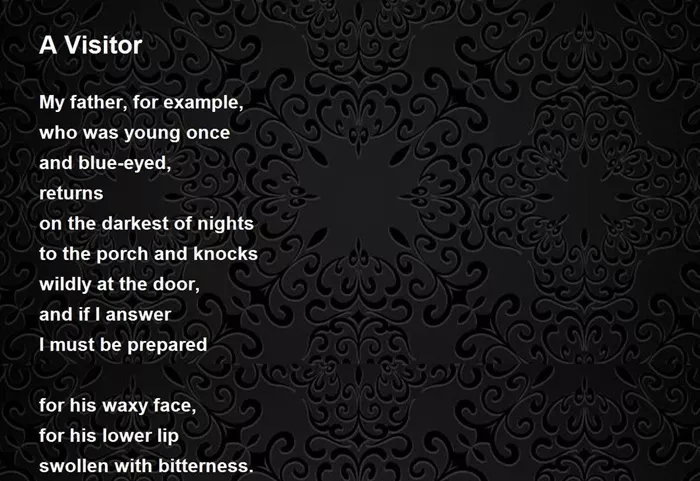Welcome to Poem of the Day – A Visitor by Mary Oliver
Mary Oliver is known for her deep connection to nature and her ability to capture the essence of life and the human experience through simple, yet profound language. One of her most cherished poems, A Visitor, exemplifies her talent for blending nature with personal reflection. In this poem, Oliver contemplates the arrival of a visitor—both physical and metaphorical—and the impact that encounter has on the speaker.
A Visitor Explanation
Overview of the Poem
“A Visitor” is a short, lyrical poem in which the speaker describes a fleeting encounter with a mysterious figure. The visitor, arriving unexpectedly, brings a message or lesson that has a lasting effect. As is typical of Oliver’s style, she uses the natural world as a backdrop for deeper philosophical and emotional reflections.
Key Themes and Symbols
1. The Visitor as a Symbol: In this poem, the visitor may be interpreted as a symbol of change, insight, or even the passage of time. Oliver often explores how fleeting moments and encounters, much like the visitor, can influence our lives in profound ways. The visitor’s arrival signals the beginning of an important, transformative experience, even if brief.
2. The Role of Nature: As with many of her poems, nature plays a significant role in A Visitor. Oliver’s careful attention to natural elements, like the landscape or the change in seasons, often mirrors the internal journey the speaker undergoes. Nature, in this poem, serves as a reflection of the emotional and spiritual shifts within the speaker.
3. Silence and Reflection: The interaction with the visitor is marked by silence and reflection, a theme commonly found in Oliver’s work. Rather than a direct conversation, the meeting is more about quiet contemplation. This may suggest that sometimes the most meaningful experiences do not require words, but rather the space for personal introspection.
Structure and Style
Oliver uses free verse in A Visitor, without a set rhyme or meter, which mirrors the unpredictable and open nature of the encounter. The lack of formal structure allows the poem to feel more natural and spontaneous, much like a fleeting visitor entering one’s life. The simplicity of the language is another characteristic of Oliver’s writing. Her clear, accessible style makes the poem relatable while still conveying profound meaning.
Interpretation
The arrival of the visitor may represent a number of things. It could symbolize a new realization, a moment of clarity, or a deep emotional shift. It may also point to the unpredictable nature of life’s lessons—how they come unexpectedly, much like a visitor who arrives unannounced. The visitor in this poem could be interpreted as a metaphor for a new thought or inspiration that disrupts the ordinary flow of life but leaves a lasting impact.
The visitor’s fleeting presence suggests that some experiences, while brief, can alter the course of one’s thoughts or actions. This mirrors Oliver’s belief in the power of nature and small moments of revelation. In her world, even the most transient experiences hold meaning and offer opportunities for personal growth.
Conclusion
Mary Oliver’s A Visitor invites readers to reflect on the transient nature of life’s lessons and encounters. Through her poetic lens, she reminds us that even the smallest of visitors can have a profound effect on our lives. Oliver’s simplicity and clarity of expression allow us to connect deeply with the universal experience of change and reflection. Like a brief but meaningful visit, the poem lingers in the mind long after it is read, offering insights into the beauty of life’s fleeting moments.

